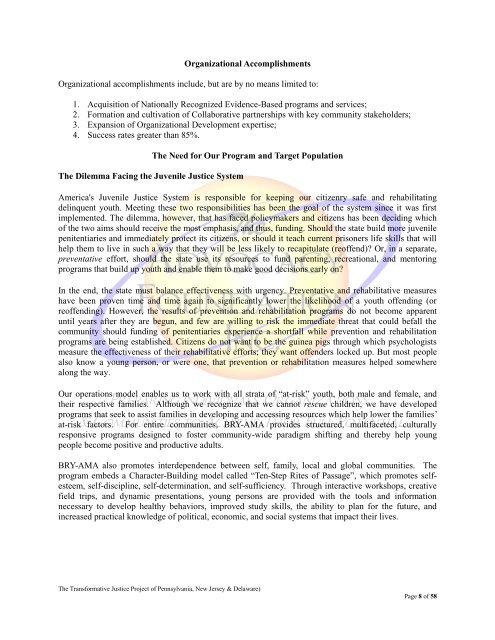The Transformative Justice Project of Pennsylvania, New Jersey & Delaware
The Transformative Justice Project of Pennsylvania, New Jersey & Delaware
The Transformative Justice Project of Pennsylvania, New Jersey & Delaware
You also want an ePaper? Increase the reach of your titles
YUMPU automatically turns print PDFs into web optimized ePapers that Google loves.
Organizational Accomplishments<br />
Organizational accomplishments include, but are by no means limited to:<br />
1. Acquisition <strong>of</strong> Nationally Recognized Evidence-Based programs and services;<br />
2. Formation and cultivation <strong>of</strong> Collaborative partnerships with key community stakeholders;<br />
3. Expansion <strong>of</strong> Organizational Development expertise;<br />
4. Success rates greater than 85%.<br />
<strong>The</strong> Dilemma Facing the Juvenile <strong>Justice</strong> System<br />
<strong>The</strong> Need for Our Program and Target Population<br />
America's Juvenile <strong>Justice</strong> System is responsible for keeping our citizenry safe and rehabilitating<br />
delinquent youth. Meeting these two responsibilities has been the goal <strong>of</strong> the system since it was first<br />
implemented. <strong>The</strong> dilemma, however, that has faced policymakers and citizens has been deciding which<br />
<strong>of</strong> the two aims should receive the most emphasis, and thus, funding. Should the state build more juvenile<br />
penitentiaries and immediately protect its citizens, or should it teach current prisoners life skills that will<br />
help them to live in such a way that they will be less likely to recapitulate (re<strong>of</strong>fend)? Or, in a separate,<br />
preventative effort, should the state use its resources to fund parenting, recreational, and mentoring<br />
programs that build up youth and enable them to make good decisions early on?<br />
In the end, the state must balance effectiveness with urgency. Preventative and rehabilitative measures<br />
have been proven time and time again to significantly lower the likelihood <strong>of</strong> a youth <strong>of</strong>fending (or<br />
re<strong>of</strong>fending). However, the results <strong>of</strong> prevention and rehabilitation programs do not become apparent<br />
until years after they are begun, and few are willing to risk the immediate threat that could befall the<br />
community should funding <strong>of</strong> penitentiaries experience a shortfall while prevention and rehabilitation<br />
programs are being established. Citizens do not want to be the guinea pigs through which psychologists<br />
measure the effectiveness <strong>of</strong> their rehabilitative efforts; they want <strong>of</strong>fenders locked up. But most people<br />
also know a young person, or were one, that prevention or rehabilitation measures helped somewhere<br />
along the way.<br />
Our operations model enables us to work with all strata <strong>of</strong> “at-risk” youth, both male and female, and<br />
their respective families. Although we recognize that we cannot rescue children, we have developed<br />
programs that seek to assist families in developing and accessing resources which help lower the families’<br />
at-risk factors. For entire communities, BRY-AMA provides structured, multifaceted, culturally<br />
responsive programs designed to foster community-wide paradigm shifting and thereby help young<br />
people become positive and productive adults.<br />
BRY-AMA also promotes interdependence between self, family, local and global communities. <strong>The</strong><br />
program embeds a Character-Building model called “Ten-Step Rites <strong>of</strong> Passage”, which promotes selfesteem,<br />
self-discipline, self-determination, and self-sufficiency. Through interactive workshops, creative<br />
field trips, and dynamic presentations, young persons are provided with the tools and information<br />
necessary to develop healthy behaviors, improved study skills, the ability to plan for the future, and<br />
increased practical knowledge <strong>of</strong> political, economic, and social systems that impact their lives.<br />
<strong>The</strong> <strong>Transformative</strong> <strong>Justice</strong> <strong>Project</strong> <strong>of</strong> <strong>Pennsylvania</strong>, <strong>New</strong> <strong>Jersey</strong> & <strong>Delaware</strong>)<br />
Page 8 <strong>of</strong> 58

















